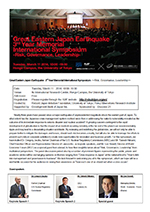~Risk, Governance, Leadership~
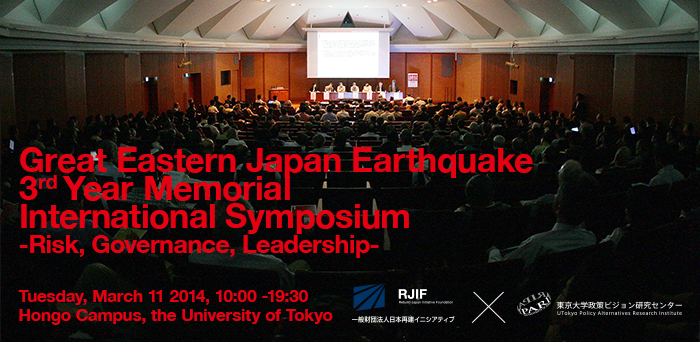
Finished: Thank you very much for your attendance.
Short Summary

Keynote Speech : “Crisis Response in Japan Viewed from Abroad”
Dr. Gregory Jaczko (Former Chairman of the U.S. Nuclear Regulatory Commission (NRC))
Under the theme of “crisis response in Japan viewed from abroad”, Dr. Jaczko gave a keynote speech on crisis management and leadership at a time of crisis based on his own experience during the Fukushima Daiichi accident.
Dr. Jaczko also mentioned the importance of risk communication. Citing the NRC’s conclusion, which later turned out to be a mistake, that the spent fuel pool in Reactor No. 4 at Fukushima Dai-ichi must have been dried up, Dr Jaczko emphasized the importance of the timely delivery of
information relevant to the possible worst-case scenario to the public when the public demands it most. Despite the inevitable uncertainty such information could contain, it would be far much better providing incorrect information than not making any information available for the fear for
making mistakes. Public perception of “concealment of information” or “cover-up” could easily be formed, subsequently leading to the loss of trust to the leaders.
He finally pointed out that in addition to do everything to prevent a crisis from happening, a system of safety and crisis management must be designed to prepare for these situations on the premise that accidents will happen, and the key element is an extensive program in crisis management and crisis communication.
Panel Discussion (1) : “Japan’s Crisis Management”
Coordinator: Dr. Hideaki Shiroyama
Panelists:
Dr. Gregory Jaczko (Former Chairman of the U.S. Nuclear Regulatory Commission)
Mr. Tetsuro Ito (Former Deputy Chief Cabinet Secretary for Crisis Management)
Mr. Koichi Kitazawa (President, Tokyo City University / Chairman, Investigation Commission on the Fukushima Nuclear Accident)
Mr. Saito William Hiroyuki (President & CEO, InTecur, K.K./ Special Advisor to the Cabinet Office of the Government of Japan)
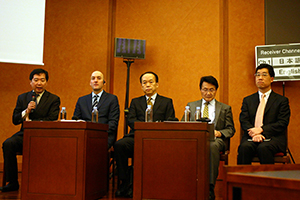
Firstly, Dr. Kitazawa, the Chairman of the Investigation Commission, referring to the lessons learnt and the remained challenges of the accident, and stated that “it is of critical importance not to discard them as “cultural problem” but to consolidate personnel and legal system.”
Discussing that crises are invariably exacerbated by human errors, Mr. Saito also addressed Japan’s continuing lack of crisis preparedness as exemplified by its insufficient response to cyber threats and the recent heavy snow at Yamanashi Prefecture occurred in March. He pointed out that current Japanese education caused fear of failures and emphasized the importance of absorbing failures as shared sets of experience rather than negative mistakes.
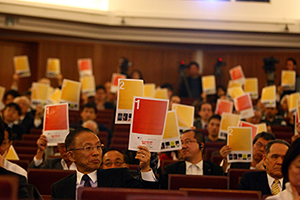
Finally, the facilitator concluded that buildup of framework considering security through technology is essential in order to realize the points that are discussed.
Keynote Speech (2) “Rethinking Risk, Governance and Leadership”
Speaker: Mr. Takeshi Niinami (CEO & Representative Director, Lawson, Inc.)
 Mr. Takeshi Niinami, CEO & Representative Director, Lawson, Inc. has delivered his keynote speech on exercising leadership during a crisis, based on the experience of the Great East Japan Earthquake, in which many of the Lawson stores along the Sanriku coastline were washed away by the subsequent tsunami. By reference to those actual cases, he shared with the audience how he prioritized and acted in such exigencies as a chairman, and described the leadership in time of crisis. (Read more)
Mr. Takeshi Niinami, CEO & Representative Director, Lawson, Inc. has delivered his keynote speech on exercising leadership during a crisis, based on the experience of the Great East Japan Earthquake, in which many of the Lawson stores along the Sanriku coastline were washed away by the subsequent tsunami. By reference to those actual cases, he shared with the audience how he prioritized and acted in such exigencies as a chairman, and described the leadership in time of crisis. (Read more)
Mr. Niinami first described importance of thoroughly shared cooperate values for leadership and decision-making during crises, stating “it is vital to set a standard which would guide the employees and local stores on decision-making at time of an emergency, and how well the standard is shared among them in advance”. At the same time, however, he also pointed out that “permeation of such corporate values is not easy” and explained that such efforts for permeation do not yield profits in short-term so that it is difficult to get a consent by employees and stockholders on implementation of those efforts.
He emphasized that permeation of the corporate values in peacetime is the invisible leadership in action.
In regard to the governance, Mr. Niinami argued that the headquarters in Tokyo should never prescribe orders when they are uninformed of local situations, and that decision-making authority must be granted to the locals.
Panel Discussion (2) “Uncertainty and Business”
Moderator: Dr. Yoichi Funabashi (Chairman, RJIF)
Panelists:
Mr. Takeshi Niinami (CEO & Representative Director, Lawson, Inc.) *
Mr. Lee Howell (Managing Director, Member of the Managing Board, World Economic Forum)
 In this session moderated by Dr. Yoichi Funabashi of the RJIF, Mr. Takeshi Niinami and Mr. Lee Howell mainly discussed what constitutes the exemplary leadership and how to build them through education and trainings.
In this session moderated by Dr. Yoichi Funabashi of the RJIF, Mr. Takeshi Niinami and Mr. Lee Howell mainly discussed what constitutes the exemplary leadership and how to build them through education and trainings.
Mr. Howell defined a good leader as an individual who is decisive, sensible and able to observe situations comprehensively. He added that although it is painstaking to find such individual, it is possible to assess quality of leadership by “establishing a holistic personnel evaluation system which allows us to identify leadership quality by how s/he sets the goal and the approach to attain the goal.”
Dr. Funabashi posed a question that whether leaders are cultivated through experiences or born with the quality. In his reply, Mr. Niinami stated that although “innate sense” is important, the culture and the nature of the environment in which one has been brought up determines what kind of a leader one will become, and claimed that “it is important that how early one has trained himself on ‘decision-making on his own’”. He added that “another important criteria for exemplary leadership is that how many life-staking decisions one has made”, emphasizing the essentiality of coaching individuals with decision-making experiences.
Session “Risk Management in Practice”
Panelists:
Mr. Daisuke Asano (Senior Deputy Director, Oil Supply and National Reserve, Ministry of Economy, Trade, and Industry)
Mr. Akihisa Shiozaki (Attorney at Law, Partner, Nagashima Ohno and Tsunematsu)
Mr. Yoshiki Hiruma (Director, DBJ Enterprise Resilience Rated Loan Program(BCM Rating)/ Environmental Initiative & Corporate Social Responsibility Support Department / Development Bank of Japan Inc)
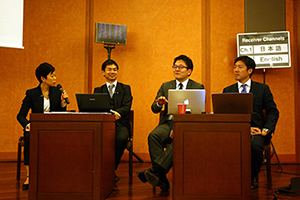
During the session, definition of ‘risk’ was discussed proceeded by inability of the Japanese government to deal appropriately with crises due to the inefficient information and Japan’s lack of culture to act decisively on its own. Referring to the recent case of massive snow at Yamanashi prefecture, it was analyzed that Japan’s officials have been unable to perform their possible operations because of these systematic weaknesses. Given such situation, the panelists discussed the pros and cons of the establishment of a “strong and leading government agency such as the U.S. Federation Emergency Management Agency. Furthermore, it was pointed that in order to cultivate leadership during crises, it is crucial to identify priorities as triages by constantly anticipating the ‘worst-case scenarios’. The discussion concluded that for individuals in charge at the local level to maximize their leadership and facilitate communication in the time of crisis, it is essential to conduct regular exercises which prepare for all unexpected events.
Outline
In the commemoration 3rd anniversary of the Great East Japan Earthquake, RJIF and UTokyo Policy Alternatives Research Institute co-hosted an international symposium focusing on risk, governance and leadership on March 11, 2014 at the University of Tokyo. More than three hundred people including former prime minister Naoto Kan attended the symposium. Moderated by Ms. Yumiko Ono, Managing Editor of The Wall Street Journal’s Japan edition online, this symposium contained two keynote speeches by Dr. Gregory Jaczko, former Chairman of the U.S. Nuclear Regulatory Commission (NRC) and Mr. Takeshi Niinami, Chief Executive Officer and Representative Director of Lawson Inc. followed by three panel discussions: “How Japan Responds to Crisis” ; “Uncertainty and Business” ; “Risk Awareness in Business Practice”. At the symposium, the audience took part in the panel sessions through answering the questions from the panelists. The symposium was covered by both Japanese and foreign media including TV, newspaper and magazine.


Report
| Date | Tuesday, March 11 2014, 10:00 -19:30 |
| Venue | Ito Hall (B2 floor), Ito International Research Center, Hongo Campus, the University of Tokyo |
| Admission | Free |
| Method of registration | Please register through the Registration Form on the bottom of this page. |
| Hosted by | Rebuild Japan Initiative Foundation, UTokyo Policy Alternatives Research Institute |
| Supported by | Development Bank of Japan Inc. |
| Sponsored by | Discover 21 |
Guest speakers and panelists
 Dr. Gregory Jaczko Former Chairman, the U.S. Nuclear Regulatory Commission (NRC)
Dr. Gregory Jaczko Former Chairman, the U.S. Nuclear Regulatory Commission (NRC) Mr. Takeshi Niinami CEO & Representative Director, Lawson, Inc.
Mr. Takeshi Niinami CEO & Representative Director, Lawson, Inc. Mr. Lee Howell Managing Director, Member of the Managing Board, World Economic Forum (WEF)
Mr. Lee Howell Managing Director, Member of the Managing Board, World Economic Forum (WEF)(* in the order of Japanese alphabet)
| Mr. Daisuke Asano | Senior Deputy Director, Oil Supply and National Reserve, Ministry of Economy, Trade, and Industry (METI) |
| Mr. Tetsuro Ito | Former Deputy Chief Cabinet Secretary for Crisis Management |
| Dr. Koichi Kitazawa | President, Tokyo City University / Chairman, Investigation Commission on the Fukushima Nuclear Accident |
| Prof. Hideaki Shiroyama | Director, UTokyo Policy Alternatives Research Institute / Vice Dean, Graduate School of Public Policy, the University of Tokyo |
| Mr. Akihisa Shiozaki | Attorney at Law, Partner, Nagashima Ohno & Tsunematsu |
| Mr. Yoshiki Hiruma | Director, DBJ Enterprise Resilience Rated Loan Program(BCM Rating)/ Environmental Initiative & Corporate Social Responsibility Support Department / Development Bank of Japan Inc (DBJ) |
| Prof. Masafumi Maeda | Vice President, the University of Tokyo |
| Dr. Yoichi Funabashi | Chairman, Rebuild Japan Initiative Foundation |
Program (as of latest schedule)
| 10:00-10:10 | ●Opening speech | Prof. Masafumi Maeda (Vice President, the University of Tokyo) |
| 10:10-10:55 | Keynote speech (1) “3/11 – Crisis Response in Japan Viewed from Abroad” 【with simultaneous interpretation】 | Dr. Gregory Jaczko (Former Chairman of the U.S. Nuclear Regulatory Commission (NRC)) |
| 11:00-12:15 | ●Panel discussion (1) “How Japan Responds to Crisis” 【with simultaneous interpretation】 | Coordinator : Prof. Hideaki Shiroyama(Director, UTokyo Policy Alternatives Research Institute) Panelists: Mr. Tetsuro Ito (Former Deputy Chief Cabinet Secretary for Crisis Management) Dr. Koichi Kitazawa (President, Tokyo City University / Chairman, Investigation Commission on the Fukushima Nuclear Accident) Dr. Gregory Jaczko (Former Chairman of the U.S. Nuclear Regulatory Commission (NRC)) |
| 12:15-13:30 | Lunch break | |
| 13:30-14:15 | ●Keynote speech (2) “Revisiting Risk, Governance, Leadership” | Mr. Takeshi Niinami (CEO & Representative Director, Lawson, Inc.) |
| 14:20-15:40 | ● Panel discussion (2) “Uncertainty and Business” 【with simultaneous interpretation】 | Coordinator : Dr. Yoichi Funabashi (Chairman, Rebuild Japan Initiative Foundation) Panelists: Mr. Takeshi Niinami (CEO & Representative Director, Lawson, Inc.) Mr. Lee Howell (Managing Director World Economic Forum) |
| 16:00-18:00 | ●Session “Risk Awareness in Business Practice” | Mr. Daisuke Asano (Senior Deputy Director, Oil Supply and National Reserve, Ministry of Economy, Trade, and Industry (METI)) Mr. Yoshiki Hiruma (Director, DBJ Enterprise Resilience Rated Loan Program (BCM Rating) / Environmental Initiative & Corporate Social Responsibility Support Department / Development Bank of Japan Inc. (DBJ)) Mr. Akihisa Shiozaki (Attorney at Law, Partner, Nagashima Ohno & Tsunematsu) |
| 18:00-18:10 | ●Closing speech | Dr. Yoichi Funabashi (Chairman, Rebuild Japan Initiative Foundation) |
| 18:10-19:30 | Convivial gathering |
※The above program is subject to change.
 APIニュースレター 登録
APIニュースレター 登録